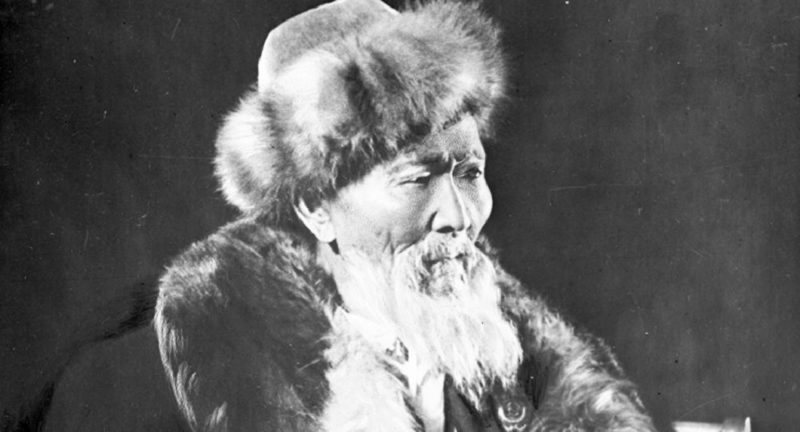Меню
Страницы
Статья
Kazakhstan celebrates the 175th anniversary of the Kazakh poet Zhambyl Zhabayev
Zhambyl Zhabayev

Zhambyl Zhabayev was born on February 16 (28), 1846 in the family of a poor but respected nomad Zhabay from the subgenus Ekey of the Shaprashty clan, which is part of the Senior Zhuz.
During his childhood, Zhambyl learned to play the dombra. Jambul’s uncle, father's brother, was a famous dombra player. At the age of 14 (according to other sources: in 1897 at the age of 12), he decided to leave home and become an akyn, earning money by singing. He sang to the accompaniment of dombra in the tolgau style (recitative). He studied the art of improvisation from akyn Suyunbai. Zhambyl sang exclusively in Kazakh. In the late XIX - early XX centuries, he repeatedly participated and won in aitys (competitions) of prominent akyns. He was famous as a master of accusatory songs. Later, from the pre-revolutionary repertoire from his words, the epics "Suranshi-batyr", "Utegen-batyr", fairy tales "Khan and akyn", "The Tale of the Lazy Man" and others were recorded.
One of the heights of Jambul's creativity is his aitys. At the end of the XIX and beginning of the XX century. Zhambyl took part in the competitions of two akyns aitys: in 1881 he defeated akyn Kulmambet, in 1895 - Sarbas, in 1902 - Dosmagambet, in 1909 - Shashubai. Zhambyl and before aitys with Kulmambet participated in small competitions - kayym-aitys.
By the time of October Revolution of 1917, Zhambyl was already a 70-year-old man who had not taken dombra in his hands for a long time. Although, according to the akyn, his spiritual rebirth and creative upsurge began. “Everything great and beautiful in our era is revealed through the image of Stalin,” said Zhambyl.
After the October Revolution of 1917, new themes appeared in the work of the akyn, already widely known by that time - "Anthem to October" (1936), "My Motherland" (1936), "In Lenin's Mausoleum" (1936), "Lenin and Stalin" (1936 ).
In his songs, one could meet almost all the heroes of the Soviet ruling elite; he gave them the features of epic heroes, legendary heroes - "Aksakal Kalinin" (1936), "Song of the Batyr Yezhov" (1937), "Klim Batyr" (1936), "Our Kirov "(1939) and others.
His songs sincerely glorified life in the USSR and were widely distributed by the authorities. The figure of ninety-year-old Jambul was presented in the form of an Eastern sage-aksakal, who welcomed the new system and its people. He becomes the most respected akyn of Kazakhstan, and his songs are part of the new life of the Kazakh aul. Since 1938, he was a deputy of the Supreme Council of the Kazakh SSR.
When the Great Patriotic War began, Private Algadai Zhambylov (1900-22 February 1943), the son of Zhambyl, went to the front. He died during the liberation of the city of Sinelnikovo, Dnepropetrovsk region.
Zhambyl Zhabayev died on June 22, 1945, 8 months before he turned 100 years. He was buried in the village of Zhambyl, Zhambyl district, Almaty region (the district and the village are named in his honor). In this aul, in the house where he lived, a museum of Zhambyl (Zhambyl) was organized, and there is a garden near the house to this day, which he had grown by himself. This aul is located outside the village of Uzynagash, about 60 km from Almaty. Later, next to Zhambyl, Nurgisa Atabaevich Tlendiev, a famous Kazakh composer, conductor, dombra player, People's Artist of the Kazakh SSR (1975), People's Artist of the USSR (1984), People's Hero of Kazakhstan (1998), was buried. This was the last will of the famous composer.
Zhambyl's poetic manner was distinguished by the psychological richness and concreteness of the depiction of life, sincerity and epic simplicity of the narrative. He combined oral forms with literary, poetical passages with prose. His songs represent a bright page of the Kazakh literature of the Soviet period. Jambul's poetry is associated with the life of the ordinary people. Zhambyl called for friendship between the Kazakhs and the Russian people, he composed many lyrical, everyday, socio-satirical songs, heroic poems and fairy tales ("Bai Kadyrbai's dog", "Black decree", "Poem of an angry heart", the poem "Utegen batyr", " Suranshi Batyr ", the tale" Khan and Akyn "," The Parable of the Lazy Man ", etc.).
In Soviet times, the songs of akyn gained nationwide fame. The poet created works imbued with Soviet patriotism and the pathos of communist ideas (poems - "My Motherland", 1936), "The Armed People", songs - "Anthem to October", "Lullaby", "Nag and Horse", "Song of the Brotherhood of People "," Lenin and Stalin "and others.
Zhambyl created songs about the Stalinist Constitution ("The Law of Happiness", "I Elect Stalin", "Servant of the People", etc.).
Became widely known and gained popularity his songs of the period of the Great Patriotic War - "The Poem of Love and Anger", "At the Hour When Stalin Calls", "Leningraders, My Children", "Moscow", "Order of the Motherland".